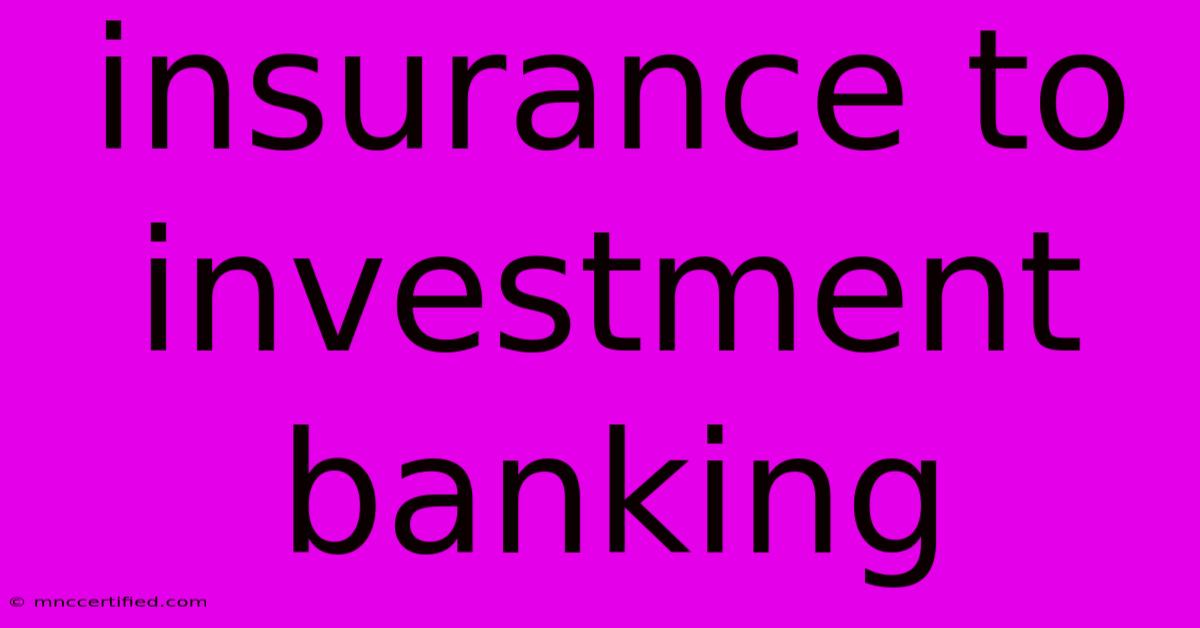Insurance To Investment Banking

Table of Contents
From Insurance to Investment Banking: A Career Transition Guide
The transition from insurance to investment banking might seem like a giant leap, but with careful planning and strategic execution, it's entirely achievable. Many skills honed in the insurance industry are surprisingly transferable, making this career shift a viable and potentially rewarding option. This comprehensive guide explores the key aspects of making this transition successfully.
Understanding the Differences and Overlaps
Before diving into the transition strategy, let's understand the core differences and surprising similarities between insurance and investment banking.
Insurance: Primarily focuses on risk mitigation and management. Roles often involve underwriting, claims processing, actuarial analysis, and client relationship management. The pace is generally steadier, with a strong emphasis on regulatory compliance.
Investment Banking: Centers around advising companies on mergers and acquisitions (M&A), raising capital through debt and equity offerings, and providing financial analysis. The pace is significantly faster, demanding long hours and a high level of analytical proficiency.
Overlapping Skills: Despite the differences, several crucial skills transfer seamlessly:
- Financial Analysis: Insurance professionals, particularly actuaries and underwriters, possess strong financial modeling and analytical skills directly applicable to investment banking.
- Risk Assessment: A core competency in insurance, risk assessment is paramount in investment banking, particularly in areas like M&A and credit analysis.
- Client Relationship Management: Building and maintaining strong client relationships is vital in both industries.
- Communication Skills: Effectively communicating complex financial information is crucial for success in both insurance and investment banking.
- Problem-Solving: Both industries present complex problems requiring creative and analytical solutions.
Strategies for a Successful Transition
Successfully transitioning from insurance to investment banking requires a multi-pronged approach:
1. Skill Enhancement and Upskilling
- Enhance your Financial Modeling skills: Take courses in advanced financial modeling, focusing on techniques used in investment banking, such as discounted cash flow (DCF) analysis and leveraged buyout (LBO) modeling. Consider online platforms like Coursera or edX for reputable courses.
- Master Investment Banking Specific Tools: Familiarize yourself with tools frequently used in investment banking, such as Bloomberg Terminal and financial modeling software.
- Network Actively: Attend industry events, connect with professionals on LinkedIn, and leverage your existing network to learn about opportunities and gain insights.
2. Gaining Relevant Experience
- Seek Internal Transfer Opportunities: Explore internal transfer opportunities within your current insurance company to roles with a closer connection to finance or investment.
- Consider a Lateral Move: Look for roles in related financial services industries, such as asset management or wealth management, to gain relevant experience.
- Volunteer or Intern: Volunteering for finance-related projects or completing an internship in investment banking can significantly bolster your resume.
3. Building Your Network
- Attend Industry Conferences: Networking is crucial. Attend conferences and events related to investment banking to meet potential employers and learn about current market trends.
- LinkedIn Optimization: Optimize your LinkedIn profile to highlight your transferable skills and emphasize your aspirations for a career in investment banking.
- Informational Interviews: Schedule informational interviews with professionals working in investment banking to gain valuable insights and learn about potential career paths.
4. Tailoring Your Resume and Cover Letter
- Highlight Transferable Skills: Focus on the skills you've acquired in insurance that are directly applicable to investment banking, such as financial analysis, risk assessment, and client management.
- Quantify Your Achievements: Use quantifiable results to demonstrate your accomplishments in your previous roles.
- Target Specific Roles: Tailor your resume and cover letter to the specific requirements of each job application.
5. Preparing for the Interview Process
- Practice Behavioral Questions: Prepare for behavioral interview questions, focusing on your problem-solving skills, teamwork experience, and ability to handle pressure.
- Technical Interview Prep: Brush up on your technical skills, including financial modeling, valuation techniques, and accounting principles.
- Research the Firm: Thoroughly research the investment banking firm you're interviewing with to demonstrate your genuine interest.
Conclusion: A Rewarding Transition
The transition from insurance to investment banking is challenging but achievable. By focusing on skill enhancement, networking, and strategic job searching, you can successfully navigate this career shift and unlock new opportunities. Remember to leverage your existing strengths, highlight your transferable skills, and demonstrate your commitment to continuous learning. This proactive approach will significantly increase your chances of landing your dream role in investment banking.

Thank you for visiting our website wich cover about Insurance To Investment Banking. We hope the information provided has been useful to you. Feel free to contact us if you have any questions or need further assistance. See you next time and dont miss to bookmark.
Featured Posts
-
Can You Backdate Auto Insurance
Nov 24, 2024
-
Arsenal Vs Forest 3 0 Post Match Report
Nov 24, 2024
-
Miami 8 Tops Wake Forest 42 14
Nov 24, 2024
-
Can An Insurance Company Sue Me
Nov 24, 2024
-
Confirmed Chelsea Starting Xi Vs Leicester
Nov 24, 2024